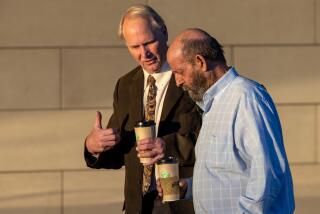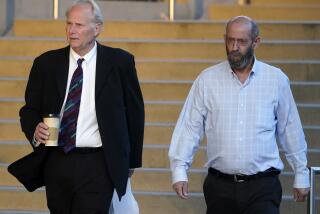As Navy rape case unravels, questions of homicide appear
The night began like many at Boorda Hall, a five-story barracks at Naval Station Great Lakes, the Navy’s premier training base on the shore of Lake Michigan in Illinois.
Somebody announced a party, and the hard drinking and beer pong began. A 21-year-old Marine lance corporal, so drunk on rum and Mountain Dew she was slurring her words, went to look for Kyle Antonacci, a Navy seaman she’d been dating off and on. Antonacci soon texted his friend Mike Pineda to help him deal with her.
Both men had sex with her that night. But what distinguished May 8, 2009, from dozens of other party nights in the barracks — what turned it into a mystery that investigators still are trying to unravel — was what happened afterward.
PHOTOS: Navy rape case unravels
Pineda, a seaman from Barstow, Calif., training as a Navy SEAL, spent three months in jail for sexual assault. Antonacci, a 22-year-old ordnance disposal trainee from Long Island, N.Y., was threatened with prosecution. The case didn’t go far: Antonacci’s body was found hanging in a closet, his nose bleeding, his face and back bruised.
The armed forces face a skyrocketing number of sexual assault cases. This investigation in particular — involving dozens of witnesses, lie detector tests and forensic exams — points up the difficulty of pursuing such prosecutions in the barracks, where drinking and sex often go hand in hand.
Witnesses, their memories clouded by alcohol, told stories that omitted key details. Antonacci admitted lying. The Navy told Antonacci’s parents that he was a troubled young man who had taken his own life. But the parents never believed it, and neither did Pineda.
For years, the parents and Pineda, 31, have tried to prove that the Naval Criminal Investigative Service hid the truth to conceal its own bungled rape investigation. And they are not alone. The former Lake County coroner says he was denied access to key evidence and pressured to call the February 2010 death a suicide. He now believes Antonacci was murdered.
“They used him as a pawn in a game to win a case, and somebody needs to answer for that,” Pineda said.
***
Antonacci was popular in the barracks — breezy and funny in a New York-tough kind of way. The lance corporal who alleged the rape was the same: fun-loving and friendly. She and Antonacci had had casual sex on a few occasions; with Pineda, her acquaintance was platonic. She’d gone to his room a few times to watch TV and have dinner. (The woman is unnamed because The Times does not identify alleged victims in sexual assault cases.)
Antonacci said the woman had come on to him in his room that night. When Pineda arrived, Antonacci left. The woman told police she was so drunk that she lay down on the bed and blacked out, and the next thing she knew, Pineda was on top of her, having sex. Pineda said she was drunk, but fully awake. After they had sex and he got up to leave, he said, she called him back and demanded a kiss. “This didn’t happen,” Pineda said she told him.
Antonacci told authorities he returned and found the woman naked in his bed. She began to cry and told him she “didn’t want to with Pineda.” Later that night, she would angrily tell police she’d been sexually assaulted. Pineda was charged with “aggravated sexual assault by substantial incapacitation,” meaning she had been too drunk to say yes.
Antonacci initially told authorities that he had left the woman lying on the bed, and heard Pineda lock the door as he left. But he told friends he later had come to believe the woman hadn’t been unconscious at all. He said he thought she had lied about the assault because she was in love with him and didn’t want him to think she had willingly had sex with his friend.
Furious at hearing this, the woman came to his room at 4:30 in the morning, warning him not to change his story, Antonacci said in a report to police. Minutes later, a Marine Corps friend of hers wielding a knife issued an even more belligerent warning, his report said. A large X was carved into the door of his room. Navy authorities moved Antonacci to another room when he requested protection.
“He was scared.... He literally didn’t know what to do,” said his sister, Karissa Phillip, who got frequent calls from her brother during those weeks.
At Pineda’s court-martial in November 2009, Antonacci revealed neither his doubts about the woman’s story nor the fact that he’d had sex with her that night, too. The jury found Pineda guilty, and Antonacci rushed up to his friend as he was being led to a military police van in shackles. He seemed stricken.
“I just looked at him and I said, ‘It’s not your fault, man,’” Pineda recalled. “And he fell to his knees and started crying.”
After that, friends and family say, Antonacci was guilt-ridden. “He said, ‘I know he didn’t do it.’ He knew this girl was lying, and he said he would do anything he could to help his friend get out of jail,” Phillip recalled.
Two months after the court-martial, Antonacci admitted to a friend that he had had sex with the woman before Pineda even arrived; the friend reported it. The Naval Criminal Investigative Service, or NCIS, warned Antonacci that he now faced possible sexual assault charges as well.
In a bid to clear himself, and perhaps trap the woman in a perjury charge, Antonacci agreed to act as an NCIS informant, secretly recording two calls to her. He needed her to tell authorities they had consensual sex, he told her in one of the calls, or he could end up in jail with Pineda.
“I’m not pushing you against the wall,” he said. “It’s just, I’m ... young, and I’m ... scared.”
Antonacci left the NCIS office at 5 p.m. An hour later, he arrived at the door of a friend, Seaman Travis Canner. Antonacci said the conversation with the woman hadn’t gone well.
“They’re going to come after me now.... My life is over,” Canner recalled him saying.
About half an hour later, Canner decided to check on his friend. When he walked in, the television was blaring. Canner found his friend hanging from a belt in his closet, resting on his knees.
Navy investigators said Antonacci had searched on his computer for “easiest way to commit suicide” and “military I hate my life.” Co-workers said he had talked about killing himself.
But his mother, Lisa Antonacci, and his father had doubts. Why was their son’s body so bruised? Why did the closet where he was found hanging seem largely undisturbed? “The pictures in the room were broken, as if there was a fight,” she said.
The family hired James Culp, a civilian military lawyer who had handled some of the highest-profile war crimes cases out of Iraq. Culp discovered that nearly half of the photos taken at Antonacci’s autopsy — including all those of his back — had disappeared from the coroner’s computer, a fact attributed to a computer glitch.
He began looking into Antonacci’s report about the purported threat from the Marine, who had admitted going to Antonacci’s room in the middle of the night to discuss the case but denied threatening him.
Why didn’t the marks on Antonacci’s neck look like a hanging? In July 2010, the family decided to exhume the body and asked celebrity pathologist Michael Baden to examine it.
Photos taken then showed small, dark marks on the back and ribs — marks Baden dismissed, but which Culp was convinced resembled stun gun burns. The exam also revealed that the hyoid — a small bone in the neck that can indicate whether someone was hanged or strangled — was missing, though the original pathologist reported he’d examined it and found it intact.
Still, the $10,000 exhumation and autopsy failed to produce the conclusive proof that Culp and the Antonaccis were looking for, and four days later, Culp, who had also taken on Pineda’s appeal, was checked into a hospital for stress.
But he was soon back on the case, tracking down Antonacci’s next-door neighbor who, Navy investigators said in their investigative summary, had heard nothing the night he died. That wasn’t true, she told Culp; she had clearly told the NCIS she heard three very loud thumps coming from his room.
In January of this year, Culp and Pineda gathered several law enforcement officers at a small veterinary clinic in Texas and subjected a pig to a million volts from the kind of stun gun they believed had been used on Antonacci — producing burns similar to the marks on Antonacci’s back.
By then, they had persuaded former Lake County Coroner Richard Keller, who had originally ruled the death “undetermined,” to look at the new material they’d assembled. Keller, almost to their surprise, agreed with them. In a new statement, he said he now believes “with a reasonable degree of certainty” that the death was a homicide.
But his opinion now carries no legal weight — he was forced to resign his post and suspended from practicing medicine for at least five years after pleading guilty to felony charges related to an overdose death at a clinic he ran.
So Culp and Pineda have been trying to persuade others to pick up the investigation. The Illinois State Police in February forwarded the case to the new coroner. Chief Deputy Coroner Orlando Portillo said Thursday the new review, because of the extent of the evidence involved, was expected to take at least six months. The Navy’s death review board has just concluded its own inquiry, and the report will be released soon.
PHOTOS: Navy rape case unravels
Pineda is living now in Arizona. An appeals court reversed his conviction in 2011, ruling that there was evidence the woman hadn’t told the truth and that Pineda might have thought she consented. The Navy declined to retry the case, and Pineda won an honorable discharge and back pay. Still, he said he wants the Navy to answer for what he and Antonacci went through.
“You think that I am going to just throw my hands up in the air after I know everything that you guys did to ... me and my friends?” Pineda wrote in an email to an NCIS agent in November. “Hey, the Navy just gave me my back pay and every … cent is going to be spent chasing you and your murdering friends down like dogs.”
Not long after, Pineda was contacted by an NCIS agent: A new criminal investigation had been opened, he was told, looking into whether he had made threats against the military.
More to Read
Start your day right
Sign up for Essential California for news, features and recommendations from the L.A. Times and beyond in your inbox six days a week.
You may occasionally receive promotional content from the Los Angeles Times.






